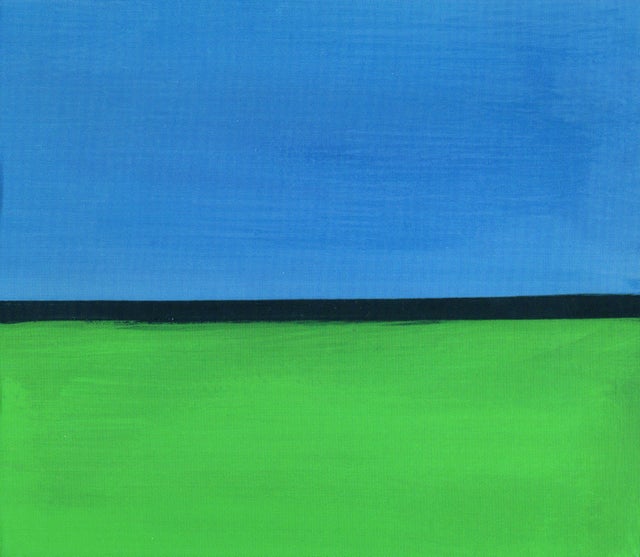- Keith Rowe
- >
- Keith Rowe - The Room (lossless)
Keith Rowe - The Room (lossless)
SKU:
$10.00
$10.00
Unavailable
per item
Lossless AIFF (16bit/44.1kHz)
ErstSolo 001
Keith Rowe's solo recording made in 2007.
|
TRACK LIST
1. The Room (38:57) (released June 7, 2007) CREDITS
Keith Rowe: guitar, electronics recorded 2007 cover painting by Keith Rowe |
"This was one of the first occasions on which I worked with Keith Rowe, who bore more or less the same relation to the electric guitar as David Tudor did to the piano (I put that in the past tense because by no stretch of the imagination could you now call them guitarist or pianist respectively)." - Cornelius Cardew, 1966
More than forty years later, Keith Rowe is still adding to his remarkable legacy of sound and color. This latest release, The Room, marks the third full-length solo recording of his career, following A Dimension of Perfectly Ordinary Reality (1989) and Harsh (1999). Each of these prior recordings marked the end of a phase of Rowe's work just before he switched to a new guitar, whereas The Room is a continuation of his recent collaborative work, as captured on records like between, cloud, A View From The Window, November Quebec and the ErstLive 005 box. The Room is a very personal project for Rowe, and he struggled with its precise conception over the last few years. It's in part a tribute to two of his most important influences, Cardew and Mark Rothko, and the creation of a recording that did justice to his feelings about these two was a long journey. After many months of thought and numerous attempts to transfer the ideas in his head to a concert context, Rowe began in early 2007 to record at his home each day. He recorded dozens of hours before finally arriving at an end result that he could live with, and those results are here. For Rowe, The Room represents an "emotional state made audible" as well as an attempt to "reject virtuosity", a philosophy which has been guiding all of his work over the past few years. Erstwhile mastering engineer Earl Howard did some crucial (and uncredited, due to the minimal text on the package) postproduction on Rowe's home recorded master, just minor tweaks on their own, but resulting in a decided overall improvement in the sound quality. The Room is the first release on the new ErstSolo imprint, and is the first standalone digipak on Erstwhile, with the entire design consisting of two triptych Rothko-influenced Rowe paintings, one on the outside and one on the inside. REVIEWS
stilton, Rate Your Music The thing about these records, these records that use electrical hum and metallic snuffling to evoke an industrial landscape--maybe we're in a cooling tower, maybe down a drain, maybe in a field by a factory (think of Il deserto rosso), maybe in a room--the thing about them is that they do tend to sound alike. The differences can be rather small: one might be more clinical, another more muddy; one might flaunt its source materials, another hide them, be more abstract. The other thing about them is that, despite these similarities, and despite their being almost pure atmosphere, it is somehow possible to distinguish the good ones from the bad. The Room strikes a balance between clean and dirt as well as between concrete and abstract and (coincidentally?) ends up as one of the best records of its sort that I know. Why I like it better than comparable records is hard to say. Perhaps, this being a solo record, it has greater focus than joint or group efforts. Certainly, it seems surprising that Rowe has made so few solo albums; his way of improvising isn't especially conversational--in fact, to call his records with others "collaborations" sometimes feels wrong; on the early AMM records, it never feels like they're all pulling together; they sound more like a bunch of people in the same room playing at the same time; there is, to my ears, no suggestion that they were trying to influence what the others were doing, even if they did respond; the records worked by a kind of group reaction rather than proaction (Cornelius Cardew's involvement with early AMM has always seems odd in this light, but I suppose AMM worked in a more collaborative way than, say, a classical composer like Stockhausen, even if not more than, say, the Spontaneous Music Ensemble). Well, maybe all this says more about the internal tensions of AMM that anything else, but in any case there's no hint of anything missing from this record, a record from which I seem to have drifted an awfully long way. The last five minutes of the record, in contrast to the rest, have an outdoorsy ambience; they feel like a new scene, or a postscript (I suppose they might have been given a separate CD track). Yet even though the aural picture is more open, the oppressive mood remains; we may have escaped the titular room, but things are really no better out here, where nothing impedes our view of the horizon, itself a thick black line. Finally, we leave our hero--suddenly cut off from him (a rather Godardian moment)--with no resolution and plenty of work to be done; a lifetime of it. |

